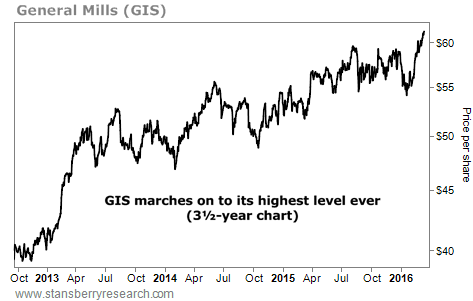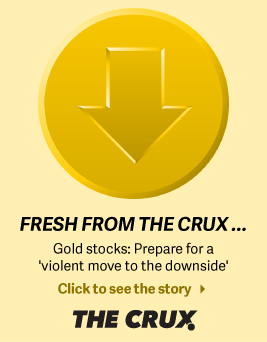| Home | About Us | Resources | Archive | Free Reports | Market Window |
The Single Most Important Thing You Can Do to Change Your LifeBy
Wednesday, March 16, 2016
Getting to work early is such a common virtue of successful people, I'm tempted to call it the single most important thing you can do to change your life.
I wasn't always an early riser. For most of my 20s, if I saw the sun rise, it was before going to bed. And in my 30s, I'd struggle to get to the office by 9 a.m.
I wasn't afraid of the work. Most days, I put in 12-14 hours. But since I'd accustomed myself to late hours in college and graduate school, I saw no reason to change my waking and sleeping habits.
"I do my best work after midnight," I used to say. And for a while, I even believed it.
My conversion happened in my early 40s... after I'd already become financially secure. So I can't argue that it's impossible to become successful unless you get up early. I did it. Plenty of others did, too.
But I can say the success I've had since then has been more dramatic... and has come a lot easier.
At the time of my early-riser conversion, I was working about 65 hours per week. I was beginning each workday at 9 a.m., working until about 8 p.m., and working at least half a day on Saturday and Sunday. (Needless to say, I wasn't seeing much of my family.)
My partner at the time was getting to work at 7:30 or 8 a.m. (I can't be sure, of course, since I was never there to greet him!) and leaving at about 6:30 or 7 p.m.
He was working about the same number of hours as I was during the week – but he didn't work at all on weekends.
I was jealous of his weekends. I promised myself repeatedly that I wouldn't work weekends either.
But when Friday came to a close, I never felt my work was done. There were always several very important matters needing attention. Therefore, one weekend after the next became filled with catch-up work.
My family didn't like it. I didn't like it. But the really frustrating thing was nobody at work seemed to notice all the extra time I was putting in. In fact, I was getting ribbed about coming in late.
After working especially late one night, I stopped for gas at about 2 o'clock in the morning.
As I handed my credit card to the lady in the glass booth, she said, "Man, you look beat!"
"I've been working almost 12 hours a day," I told her. "And half days on weekends."
She looked at me, unimpressed.
"You talk about it like it's a virtue," she said.
"Well, if working long hours isn't a virtue," I shot back, "what is?"
"Getting to work first," she said.
It was bizarre – being lectured about virtue by a gas jockey at 2 a.m. But I knew she was right.
For all the extra hours I put in, my partner – who had his weekends free – had cornered the market as far as the Puritan work ethic was concerned.
He seemed more virtuous not only to our employees but also, I suddenly realized, to me!
There's something about getting in earlier that seems wiser, nobler, smarter, and just plain more industrious than working late.
Getting to work earlier says something about being energetic, organized, and in control.
Staying late leaves the opposite impression: You're diligent but disorganized, earnest but erratic, hardworking but a drudge.
In his book, How to Become CEO, Jeffrey J. Fox puts it this way:
The lady in the glass booth was right. Getting to work first was better than working until dawn. From that moment on, I resolved to get to work earlier. And I did.
At first, it was difficult... and my success was sporadic. But then I came upon a plan that worked.
I resolved to set my alarm clock a minute earlier each day. A single minute would feel like nothing, I figured. Yet in the course of two months, I would have moved the start of my day back by an hour.
I used this minute-per-day program to move my at-work time from 9 a.m. to 8:30 a.m... then to 8 a.m... and then to 7:30 a.m.
Nowadays, I typically wake up at 5:30 a.m. and arrive at my desk (or my workout) at 6:30 a.m.
"Early to bed and early to rise, makes a man healthy, wealthy, and wise," Ben Franklin advised almost 300 years ago.
Taking that path made a big difference in my life. And I'm not the only one.
There are several studies showing successful entrepreneurs – and most CEOs – get to work at least an hour before their employees.
Most of the wealthiest people I know get up early.
In fact, this is such a universal trait among successful people that I WILL now call it the single most important thing you can do to change your life.
Regards,
Mark Ford
Further Reading:
Last year, Mark shared a classic story that illustrates how successful people use their spare time. If you want to learn how to become one of these people, click here.
Mark has also shared his 15 ways to boost your charisma. His tips are a great way to get more out of your business relationships. Learn all of them right here.
Market NotesANOTHER WIN FOR BIG FOOD It has proven to be one of the market's steady winners so far in 2016... And today's chart highlights another elite company in the industry ripping higher.
You may not have realized it, but big-name food-industry stocks are quietly outperforming the market. Meat companies Tyson Foods and Hormel, spices maker McCormick, and soup maker Campbell Soup are all up double digits over the past couple months. And today, we're adding another "Big Food" business to the list...
General Mills (GIS) is a $36 billion food giant with a portfolio of some of the most popular brands out there... many of which you might be able to find in your house right now. These include Cheerios cereal, Yoplait yogurt, Häagen-Dazs ice cream, Pillsbury dough, and Nature Valley granola bars. And the company is adapting to America's latest health trends, recently acquiring organic brand Annie's and committing to remove artificial flavors and colors from its cereals.
GIS is in a solid long-term uptrend, as you can see below. The stock is up nearly 60% over the past three and a half years and hit a new all-time high earlier this week. Big Food continues to trounce the market...
 |
Recent Articles
|



